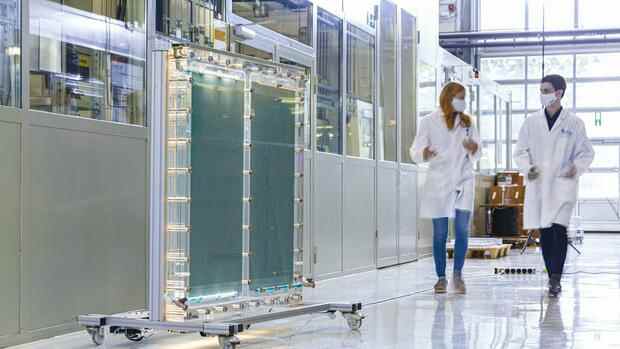The first exascale computer in Europe should be in North Rhine-Westphalia by the end of 2023.
(Photo: Research Center Juelich)
Brussels The EU is catching up with the USA in the supercomputer race: In Bologna, Italy, the fourth fastest computer in the world will go online this Thursday. The supercomputer called Leonardo has a computing power of up to 250 petaflops. That corresponds to 250 trillion arithmetic operations per second.
The world’s third-fastest computer was launched in Kajaani, Finland, in June. The LUMI has 309 petaflops. The supercomputer Marenostrum 5 in Barcelona, Spain, which is expected to take fifth or sixth place in the rankings, could follow next spring. “We are now a computer superpower,” says a senior EU official.
Germany’s fastest computer, the Juwels in the Jülich research center in North Rhine-Westphalia, is currently in twelfth place worldwide. The first exascale computer in Europe is scheduled to go into operation here at the end of 2023. The next-generation supercomputer, project name Jupiter, would do more than a thousand petaflops – and could move up to number one. The exascale computer Frontier in the US state of California currently holds the top spot, followed by the Japanese supercomputer Fugaku. Jupiter will likely be even faster than Frontier, says EU official.
A billion euros for supercomputers
The European strategy seems to be working: In 2018, the EU Commission and the Member States launched the European High Performance Computing Joint Undertaking (EuroHP JU) initiative. With one billion euros in funding, half each from the EU budget and half from the national budgets, Europe should advance into the top ten supercomputers.
Top jobs of the day
Find the best jobs now and
be notified by email.
The computing power of Jupiter, Leonardo and Co. is made available to European scientists, who can use it, for example, for complicated long-term calculations of the global climate or in medical research. For example, supercomputers were used in the development of the corona vaccines. They are also indispensable for artificial intelligence.
Access to the computers is assigned according to certain priorities. Half of the capacity is reserved for European projects, the rest is distributed nationally. The demand for computing power in Europe is significantly higher than the supply, the EU official said. From 2024, at least 3000 petaflops will be available across Europe.
The hardware of the European supercomputers comes either from the US manufacturer Hewlett-Packard Enterprise or the French company Atos. The next technological leap is already taking place at the same time: In October, the EU Commission announced that quantum computers would go into operation at six locations in the second half of 2023.
These would be integrated into the supercomputer network and increase computing power. Hardware and software come exclusively from the EU. Jülich is also represented in this group.
More: Bosch secures access to quantum computers from IBM
